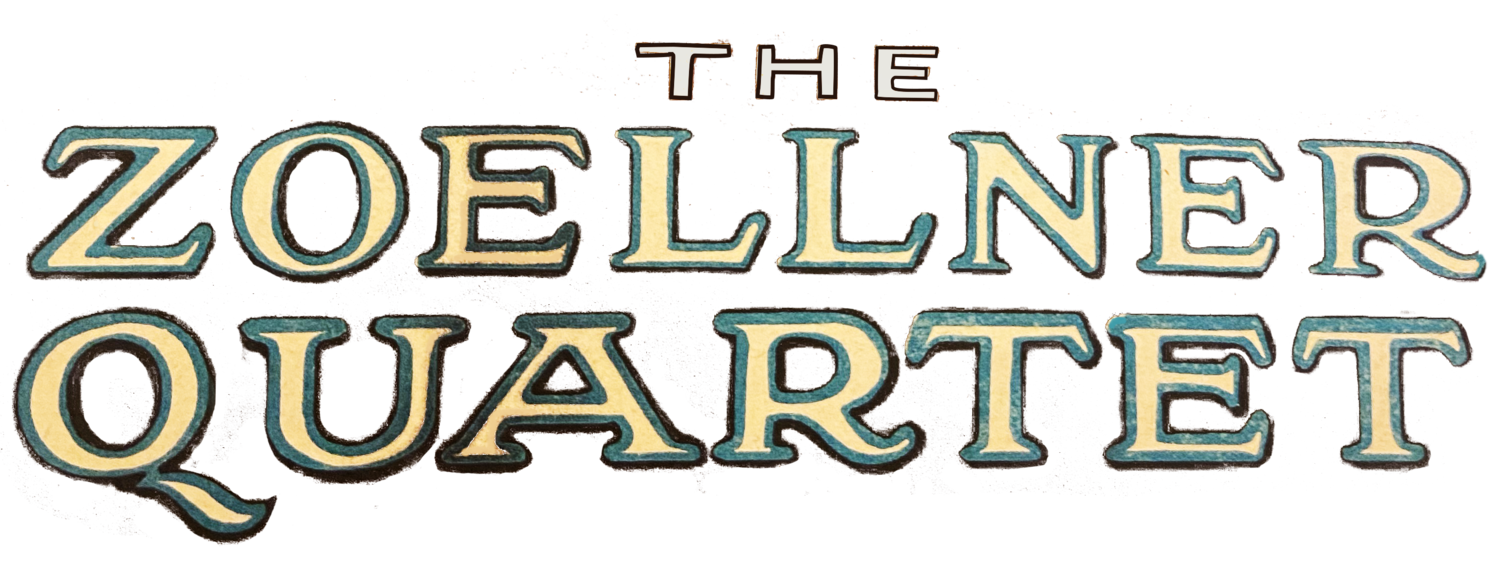QUEST FOR THE LOST QUARTET
The Story of the Zoellners
America’s Forgotten Chamber Music Pioneers 1904 - 1944
By Joseph Zoellner’s great-granddaughter, Alexandra Foley, and Liane Schirmer
The Zoellner Quartet….
Performed in Europe and North America from 1904 to 1944
Acclaimed for democratizing chamber music in North America
Had a female leader: Antoinette Zoellner was first violin
Established the Zoellner Conservatory of Music in Los Angeles in 1922
Gave over 3000 concerts across North America in over 100 cities
Became the first string quartet to perform music based on Native American melodies for Native Americans
Entertained audiences from all strata of society, practicing and performing “on the fly”, from the forest floor, the prairie, and station platforms to South Dakota colleges and Carnegie Hall
Loved by people of influence including the Belgian royal family, the last Tsar of Russia, Helen Keller, Albert Einstein, Charlie Chaplin, Walt Disney, Charles Lummis, Arthur Farwell, Ernestine Schumann-Heink, Will Rogers, and Paul Revere Williams
Instrumental in the emergence of Los Angeles as a cultural center
History
Founded in 1904 by the Brooklyn-born violinist of German descent, Joseph Zoellner, Sr., and his three children, Joseph Jr., Antoinette, and Amandus, this family ensemble became one of the most acclaimed quartets on both sides of the Atlantic in the early 20th century. With support from San Francisco arts patron Ethel Crocker, the Zoellners moved to Brussels in 1907 to study at the Conservatory of Music, where their talent drew the royal attention of Tsar Nicholas II of Russia and the Belgian Court.
Returning to the U.S. just before World War I, the quartet embarked on transcontinental tours that would redefine chamber music in America. Between 1915 and 1929, they played more than 3,000 concerts, performing in formal venues, frontier schools, railroad stations, and in Oklahoma for 600 members of the Cheyenne Nation. Helen Keller, after hearing them play, wrote, “You are masters of a wondrous art, sight is given, the blind and deaf ears hear sweet, strange sounds.”
Settling in Los Angeles in 1918, the family founded the Zoellner Conservatory of Music at 3839 Wilshire Blvd., now the site of the Wilshire/Western Metro station. The Conservatory became a hub for American composers like Charles Skilton and Arthur Farwell, and a refuge for European musicians who had emigrated to the New World.
Their weekly KHJ Radio broadcasts and regular performances at venues such as the Biltmore Hotel, Royce Hall, U.S.C.’s Bovard Auditorium, and the Ebell Club helped bring chamber music to a broader public.
Antoinette Zoellner, as first violinist, broke barriers as one of the first women to lead a professional quartet. She was so admired that a suffragette once shouted mid-performance, “A woman leading three men! Votes for Women!”
By the time Joseph Zoellner, Sr. passed away in 1950, the family had performed more than 4,000 concerts and left an enduring legacy. These musical pioneers made chamber music accessible, inclusive, and popular across North America.
Discovery of the Zoellner Archive: UCLA Special Collections at the Charles E. Young Research Library
Alexandra Foley’s childhood friend, Liane Schirmer, unearthed the archive in February 2020 and immediately contacted London-based Alex, who was coincidentally in California at the time. Several days into their research, the pandemic struck, and Alexandra returned to London. During the lockdowns, Alexandra decided to write the book and began to engage with her mother, conducting a series of informal interviews over the next several years.
Unbeknownst to Foley, the collection had been donated to UCLA in 1985 by her mother’s estranged cousin, Ruth Jalof, who had rescued it from a collapsing barn in Northern California.
Spanning the years 1904–1944, the archive includes hundreds of performance programs, press clippings, reviews, correspondence, and diaries, a treasure trove that fills a missing chapter in the story of American chamber music. It offers rare insight into Los Angeles’s early cultural life and the evolution of classical music in post–World War I America.
Together Foley and Schirmer have researched and pieced together the Zoellners remarkable journey, which also speaks to Foley’s heartfelt search for her own American roots.
With a powerful foreword by Professor William Deverell, Dean of Humanities at USC, Quest for the Lost Quartet restores the Zoellners rightful place in American chamber history. The authors wish that this book be an homage to Joseph Zoellener’s vision, which they feel is all the more resonant as Los Angeles prepares to host the 2028 Summer Olympics.
Quest for the Lost Quartet is soon to be published by Hat & Beard Press (www.hatandbeard.com).
For more information or to reserve a copy of Quest for the Lost Quartet, please contact: Alexandra Foley: alexfoley1066@gmail.com and/or Liane Schirmer: lianeschirmer@gmail.com

